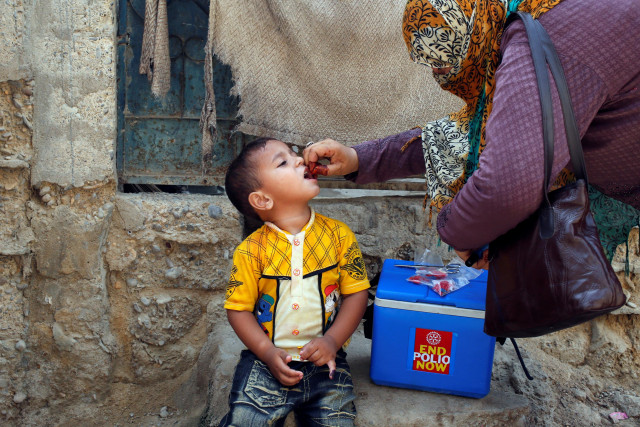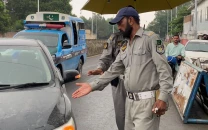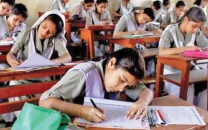Anti-polio drive stumbles just before finish line
Violence affects vaccination campaigns across the country

PM's adviser on polio eradication says campaign was a five-day affair and completed on schedule. PHOTO: REUTERS
But the entire exercise suddenly suffered a major setback after a slew of violence affected campaigns against the poliovirus across the country.
A fresh wave of attacks erupted after a ludicrous propaganda campaign to try and frame the polio vaccine as being injurious for health.
Things ran smoothly until 10:30am on April 22, when several children allegedly felt unwell soon after been given the vaccine at a school on the outskirts of Peshawar. The children were rushed to Hayatabad Medical Complex (HMC) and many to other health facilities, where they began blaming the vaccine.
Health officials, however, immediately disputed the claim.
But by 11am, the entire set-up was disrupted and polio workers started facing resistance. Over 34,000 children were brought to different hospitals in Peshawar as parents feared a reaction from the vaccine. All of the children, however, were sent back home and not a single casualty was reported.
Officials are calling the latest attacks on polio workers and security personnel deployed to protect vaccinators a 'turning point'. Two policemen were gunned down in Khyber-Pakhtunkhwa (K-P), apart from a female health worker who was part of a polio vaccination team in Balochistan. A number of other non-fatal attacks have been reported in Punjab, Balochistan, and K-P.
It took four years of hard work to bring down the number of polio cases from 306 in 2014 to 12 in 2018. The reduction had given officials hope that the virus could be eradicated and Pakistan declared polio-free by the end of the year.
"It has shocked the entire programme…the management and the staff…There is now a sense of fear and insecurity among the staff [polio vaccinators] since there is a very real possibility of attacks," said a senior health official in Islamabad who is dealing with the nationwide vaccination drive.
Falsehood flies, truth limps
The official, who requested anonymity as he was not entitled to speak to the media, was confident that the government's swift response to the school propaganda stunt had brought things under control. "But the stunt has already met its goal of misleading parents, and now, we are facing another challenge – convincing parents that the vaccine is safe, which will obviously take time."
According to another senior official who has been dealing with the national emergency operation centre, threats to polio workers have always existed, but in other forms.
Polio vaccination drive was not cancelled, says PM's adviser
"Earlier, militants warned polio workers not to inoculate kids against the crippling virus and threatened them with violence. Now we are facing another challenge, public perception," the official explained.
As vaccination campaigns across the country concluded on Saturday, officials believed that the propaganda stunt had given a second wind to those already running campaigns against polio drops.
"Now that they (vaccination opponents) think they were right, these polio workers are reluctant to be proactive and in many areas, the coverage fell below 30%," the official said, adding that in K-P alone, 1.3 million children were not vaccinated, which was the highest number of children missed in a long time.
However, Babar Bin Atta, the prime minister's focal person on polio eradication, was more optimistic, maintaining that things would return to normalcy.
He admitted that rumours had panicked the general public and ultimately a number of parents refused polio drops for their children, but he was hopeful that tweaking the vaccination strategy will be enough to change the perceptions and rectify the situation.
"We now have this challenge of public perception and have to counter it," Atta told The Express Tribune.
With the recent attacks, polio workers said the consequences of the recently staged drama posed serious threats to their lives.
"Even if we have police protection, we still fear for our lives because they kill police personnel as well," a female polio worker told The Express Tribune.
Many polio workers who are assigned to inoculate children on the outskirts of Peshawar said their families were reluctant to allow them to work for the vaccination programme.
"Relatives met with my father and warned him somebody could kill me during the campaign," the polio worker said. "My relatives were worried for me and asked my parents to stop me from vaccinating children."
Deja vu
Officials believed that the virus could have been eradicated by 2012, but then, the first attacks on polio worker began in December 2012 in South Waziristan, and the situation spiralled out of control. Since then, at least 62 people including security personnel and polio workers have laid down their lives in the service of Pakistan's children.
Officials said that the resurgence of the virus was traceable to Afghanistan. In 2012 and 2013, the virus started circulating specifically in regions bordering Afghanistan, and genetic sequencing of the virus has proven that it migrated from Afghanistan multiple times, although, at the same time, the virus detected in Afghanistan migrated from Pakistan.
This also was when the number of sites for collecting environmental samples for surveillance was increased and a total of 57 sites were identified. Environmental samples are collected after varying intervals from 57 sites from 29 cities nationwide.
Recently, polio cases were reported in Kambar, Jacobabad, Sukkur, Hyderabad, Rawalpindi, Quetta, Qilla Abdullah, Bannu, Hangu and Bajaur. It was an unusually high number, and one of the few glimmers of hope was that Shaheen Muslim Town in Peshawar tested negative after 18 months of positive tests.
A total of eight cases have been confirmed from across the country in the first four months of 2019, with six from K-P and one each from Sindh and Punjab. Interestingly, the erstwhile tribal districts had remained polio-free for almost two years, but cases have been reported in Bajaur since the merger with K-P.
Reports refuted
The government has refuted reports that the latest nationwide immunisation drive was cancelled owing to heightened security threats.
In a tweet, Atta said the campaign which commenced on April 22 was a five-day affair which had concluded as per schedule.
" … let me clearly state that National Polio Campaign was a 5 day affair. It started on Monday & Ended Yesterday. The LQAS (survey to check 95% optimum levels) has been stopped as we know the quality is not 95%. Why waste Government/Donor resources?" he wrote on Twitter.
The prime minister's focal person on polio eradication said the details of the campaign, including the number of children vaccinated and refusal cases, would be released later.
Another official working on anti-polio efforts also presented a similar view in a talk with The Express Tribune. "The nationwide campaign was scheduled to run for five days, starting on Monday and with Friday as the last catch-up day. That is how it panned out so how can we say the immunisation drive was cancelled?"



















COMMENTS
Comments are moderated and generally will be posted if they are on-topic and not abusive.
For more information, please see our Comments FAQ